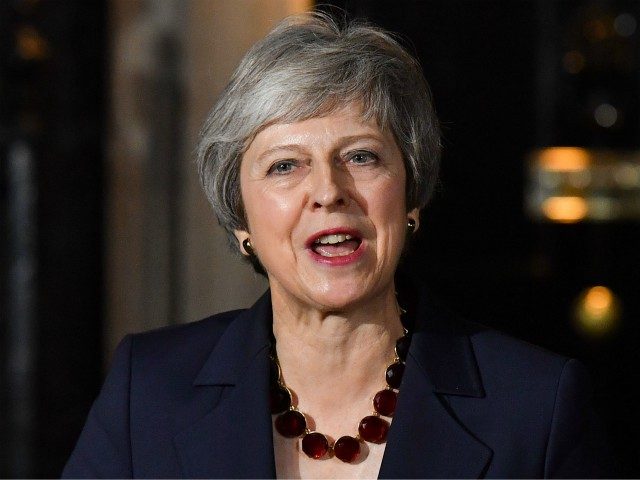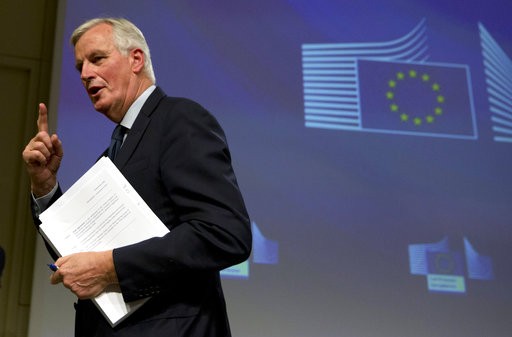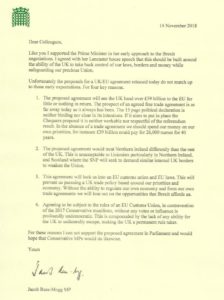Prime Minister Theresa May spoke outside her official residence on Downing Street Wednesday evening after a marathon cabinet meeting to discuss the “technical level” agreement she has struck with Brussels negotiators that pro-Brexit leaders have dismissed as the “worst deal in history”.
The Cabinet — a small group of leading ministers who make up the British government’s leadership team under the Prime Minister — met at Downing Street at 1400 GMT, and were in session for around five hours. The meeting was called in response to the Prime Minister having reached a basic deal with the European Union on Britain’s withdrawal from the European Union.
The details of the deal were leaked to the Irish press before the Cabinet had even been able to see them, leading to accusations that the European Union was treating the Prime Minister with “contempt”. Key Brexiteers were incredibly scathing about the reported details of the deal, including Brexit leader and former UKIP boss Nigel Farage, who told Breitbart News Daily on Wednesday morning that he was “absolutely incensed” and that it was “the worst deal in history”.
Tory Brexiteer Rees-Mogg said of the Prime Minister’s plan on Tuesday evening: “…she hasn’t so much struck a deal as surrendered to Brussels, and given in to them on everything that they want, and tried to frustrate Brexit. It is not so much the vassal state any more, as the slave state.”
Read Below for the latest updates on this developing story…
Update 2359 — Could a coup already be in motion?
May’s Brexit plan is not going down well with Brexiteer MPs — or the Grassroots — with micro-blogging website Twitter alive with anger as keen watchers wade through the massive draft document finding nasty surprises.
Newton Abbott MP Anne Marie Moris believes the damage is already done, however, telling the BBC Newsnight programme that in her opinion, Graham Brady MP already has the 48 letters from Conservative MPs required to trigger a vote of no confidence in the Prime Minister.
If that is true, it by no means suggests the end is nigh for the Prime Minister quite yet. The procedure will see Mr Brady first telephone those who have already sent letters to see whether they still wish to proceed, which may see the number dwindle below the threshold.
It is also rumoured that the Prime Minister has allies who have sent Brady letters with the intention of withdrawing them if the number is reached, scuppering a coup as it starts and giving the Prime Minister advance warning of a move against her.
Even if it goes to a vote, it is perfectly possible that Theresa May could muster the votes to survive the contest — many Tory MPs believe this is the wrong time to oust the Prime Minister, even if they want her to go eventually.
Like potential cabinet resignations, this process may lag behind — in the meanwhile, Graham Brady MP will be one of the most keenly watched members of the house for days to come.
Update 2055 — Read Barnier’s Speech
The full text:
We’re here together following the publishing of a declaration on the framework for our future relationship and that is the result of intense negotiations started 17 months ago.
This agreement is a decisive critical step in concluding the negotiations. It’s also the achievement of a methodology which has been carried out in transparency from the word go and fully in the respective mandates.
This draft agreement has 118 articles, 3 protocols a series of annexes. This is the draft. There are no more colours, no bits in green as before. ‘White is the new green,’ so to speak, and I certainly hope each and every one of you will take time to read the whole of the text.
This is a very specific and detailed document, as you will expect from an international document bringing legal certainty to all those people and all the subjects with respect to managing the consequences of Brexit.
CITIZENS RIGHTS
Five of those — citizens rights have always been our common priority. And it has been established that during the transition they can live their lives as before — to study, work, to receive benefits or to be joined by their families there throughout their lifetime.FINANCIAL SETTLEMENT
And then there is the financial settlement. We have agreed that the financial commitments be respected amongst the 28 — ALL those financial commitments. Together, we wanted to assure all those regions that have projects supported by the European Union [continue to be supported].EURATOM AND INTELLECTUAL RIGHTS
And my third point on which we agreed is on an orderly withdrawal, for example those questions related to Euratom, the protection of existing intellectual rights… and there is the use and protection of data.GOVERNANCE OF THE WITHDRAWAL AGREEMENT
One fourth major area where I think we found a good solution is the governance of the withdrawal agreement. It is important for us and the UK that this agreement be well implemented. This draft agreement creates a framework of political resolution for dispute and where the disagreement falls into EU law, the court of justice will continue to play its role.TRANSITION PERIOD
In the fifth point, we have agreed on a transition period. The UK will leave the EU and all the institutions on the 29th of march 2019. But for a period of 21 months from the 30th of March 2019 to the 31st of Dec 2020, we have agreed to preserve the current situation with respect to the internal market, with respect to the customs union and with respect to the European policies and rights that go along with it. This allows for businesses and individuals to adapt and prepare. We also have the possibility to extend this once by a limited period.THREE PROTOCOLS
This agreement includes three protocols:GIBRALTAR PROTOCOL
One of those protocols is on Gibraltar. That creates the basis for administration on a series of subjects, the rights of citizens, taxation, tobacco, fisheries, the environment, but also police and customs cooperation, arranged thanks to the bilateral cooperation between the UK and Spain.CYPRUS PROTOCOL
The second protocol relates to Cyprus’s sovereign bases. This enables for the continuity of existing protocols in particular enabling the 11,000 Cypriot citizens established on territories under British sovereignty to continue to live as they do today.NORTHERN IRELAND PROTOCOL AND THE BACKSTOP
The third protocol concerns Ireland and Northern Ireland. We have now found a solution to avoid a hard border and the dividing of Ireland. First, we will use our best endeavours to solve this issue for the long term through official agreement. If we are not ready by July 2020, we could jointly consider extending the transition to provide for more time. Only if, at the end of the transition, extended or not, we are still not there would the backstop solution we agreed kick in.This backstop solution has evolved considerably from the original EU proposal from February this year. Over the last few weeks we have worked with the UK on the basis of their proposal. In the backstop scenario, we agreed to create an EU-UK single customs territory where Northern Ireland will stay in the same territory as the rest of the UK. Northern Ireland would remain aligned with those rules of the single market that are essential to preventing a hard border.
The UK would apply the EU’s customs code in Northern Ireland. It would allow Northern Ireland to bring goods into the Single Market without restrictions.
The text also makes clear that the Northern Irish economy retains unfettered market access to the rest of the UK. This single EU-UK customs territory would mean that UK goods get tariffs and quota free access to the EU 27 market.
For competition to be fair in such a single customs territory, we have agreed taxation and environmental standards.This will ensure that UK manufacturing will compete on a level playing field.
An essential condition for the single customs territory to cover fisheries and agriculture products will be agreed between the Union and the UK on access to waters and fishing opportunities.
Overall this backstop shows we have been able to meet common ground to protect the Good Friday Agreement, to preserve the Single Market and Ireland’s place in it, to respect the UK’s territorial integrity and constitutional order, and to protect the common travel area.
is backstop is not meant to be used. Our objective is to make a new agreement.
THE FUTURE RELATIONSHIP
This leads me to my final point on the framework for the future relationship. We will be ready to start that netotation on 30th March 2019. What we have today is a political statement and we’re drawing a basis for a new partnership which is a free trade area based on regulator and customs cooperation in depth and with a level playing field. Our objective is to abolish customs duties and quotas based on what we’ve proposed in the withdrawal agreement.We will be looking to police and security cooperation, foreign policy, external security, and defence.
We’re going to start working with the 27 member states and I will start working tomorrow with the Parliament with the objective of the UK to finalise the declaration to present it to the European Council.
FINAL THOUGHTS
Ladies and Gentlemen, we have reached a crucial stage. There is still a lot of work. I know that the path is still long and difficult to arrange an orderly withdrawal, but also to build an ambitious and sustainable partnership with the UK. There is still work to be done here [in the EU].This negotiation has never been one against the other — we have always negotiated with the United Kingdom, not against, in respect of their sovereign choice to leave the European Union. Tonight is a crucial step in an orderly withdrawal and a basis for building trust before a new relationship. The United Kingdom will always be our friend, our partner, our ally. I believe that we have made decisive progress.
Update 2050 — Brexit leader Nigel Farage is angry
Farage said today is a historical low point in the trust between elector and elected in his daily spot on London talk radio station LBC. Recorded before the Prime Minister spoke:
Update 2040 — What fallout can the Prime Minister expect?
Despite the claim of cabinet unity made in the Prime Minister’s address, various Westminster insiders are claiming up to a third of the members of the cabinet were dissatisfied with May’s deal and only one Brexiteer had anything good to say about it — environment secretary Michael Gove. There have been no resignations among these dissatisfied members yet, but the fallout from the so-called Chequers meeting which saw the resignations of Brexiteer big-hitters David Davis and Boris Johnson took days to materialise.
The atmosphere within today’s meeting was apparently even more fraught than at Chequers. May’s combative attitude — telling Brexiteers it is her deal or no Brexit, and telling Remainers that it is her deal or a Hard Brexit.
Update 2020 — Barnier: The UK and Ireland will remain in the EU customs area
Barnier stokes the Brexiteer nightmare. The draft text shows the transition period can be extended and that Northern Ireland — an equal and full member of the United Kingdom — will stay in the Single Market and Customs Union.
Mr Barnier remarks that “It’s clear that Northern Ireland’s economy retains unfettered access to the rest of the UK” — merely mentioning this may imply this simple constitutional fact was up for discussion during negotiations.
Update 2006 — Michel Barnier speaks
Speaking in Brussels Wednesday evening, the European Union’s chief negotiator had his chance to gloat over bouncing the United Kingdom’s Theresa May into accepting a Brexit deal which appeared to prevent Britain from actually leaving the European Union’s laws and institutions at all.
Holding a thick wad of paper aloft, the Eurocrat hailed “Intense negotiations — very intense negotiations” and the “precise and very detailed document”.
Update 2003 — The draft agreement has been published by the European Union
Competitive speed readers rejoice — the 585-page document is live. Download it here.
The Brexit Department is on hand to help, however:
Update 2001 — Jacob Rees-Mogg makes his move
Jacob Rees-Mogg, leader of the Brexiteer ERG group of MPs has sent a letter to his colleagues in response to the Cabinet backing Theresa May’s soft Brexit deal. Perhaps unsurprisingly, he is not minded to support the plan, noting the Prime Minister proposes to send tens of billions of pound sterling to the European Union “for little or nothing in return” and that the deal would weaken the United Kingdom by treating Northern Ireland differently to the rest of the nation.
Click through to read the whole call to arms sent to his fellow members:
Update 1950 — Hot Takes Pour In
The reactions to the Prime Minister’s speech are flowing in thick and fast, with EU chief negotiator Michel Barnier expected to make a statement himself in around ten minutes time. His EU colleague Guy Verhofstadt was quicker off the mark, however, to express his delight that May’s deal would ensure a “close relationship between the EU and UK” in future, and to communicate his hope that Britain would change its mind and rejoin the European Union.
Ulster Brexiteer Sammy Wilson MP has been a familiar sight on Britain’s television screens in recent days as the DUP’s Brexit spokesman gives the views of Theresa May’s crucial parliamentary partners. Without their 10 MPs, May does not have a working government. Following criticism that May’s deal as understood tonight is an abject betrayal of the agreement their two parties have, his comments were quite clear:
Update 1940 — Read the Prime Minister’s address
The Prime Minister gave a short address outside Downing Street Wednesday evening — read the full transcript here:
The cabinet has just had a long detailed and impassioned debate on the draft withdrawal agreement and our declaration on our future relationship with the European Union. These documents were the result of thousands of hours of hard negotiation by UK officials and many meetings with EU countries.
I firmly believe that the draft EU agreement is the best that could be negotiated and it was for the cabinet to decide whether to move on in the talks.
The choices before us were difficult — particularly in relation to the Northern Ireland backstop. But the collective decision on the cabinet was that we should agree the draft agreement and the outlined political declaration.
This is a decision which enables us to move on and finalise the deal in the days ahead. These decisions were not taken lightly, but I believe it is in the national interest.
When you strip out the details, the choice was clear. This deal delivers on the referendum which brings back control of our money, laws, and borders, ends free movement, protects jobs and ensures security and union. Or leave with no deal, or no Brexit at all.
I know that there will be difficult days ahead and there will be intense scrutiny which is entirely as it should be.
But the choice was this deal that allows us to take back control, and build a bright future for our country or going back to square one with more division and uncertainty and a failure to deliver on the referendum.
It is my job as Prime Minister to explain the decisions the government has taken and I stand ready to do that beginning tomorrow with a statement in Parliament.
I believe that what I owe to this country is to take decisions that are in the national interest and I firmly believe with my head and my heart that this decision is in the best interest of the entire United Kingdom.

Britain’s Prime Minister Theresa May gives a statement outside 10 Downing Street in London on November 14, 2018, after holding a cabinet meeting where ministers were expected to either back the draft bexit deal or quit. / BEN STANSALL/AFP/Getty Images
Update 1935 — Nigel Farage reacts
Britain’s Brexit leader appeals to the few Brexiteers within the cabinet to act honourably:
Update 1923 — The Cabinet has approved the Prime Minister’s plan
The Prime Minister says after hours of “impassioned debate” the cabinet has agreed to back her deal. If any cabinet resignations are to come, there were no allusions to them in the Prime Minister’s brief statement.
Update 1920 — The Prime Minister has appeared on the steps of Downing Street
British Prime Minister Theresa May has emerged from a marathon session of the cabinet to face the waiting press. The cameras have been set up for an anticipated statement that had at times been thought to have come at 1500, then 1700 as the meeting stretched on.
Update 1905 — the Cabinet meeting has broken up
The meeting between the top ministers in the United Kingdom’s government has now ended, British state broadcaster the BBC reports. There has been no sign of ministers, or the Prime Minister, leaving the building yet — most having been inside for over five hours.
This story is developing…



COMMENTS
Please let us know if you're having issues with commenting.